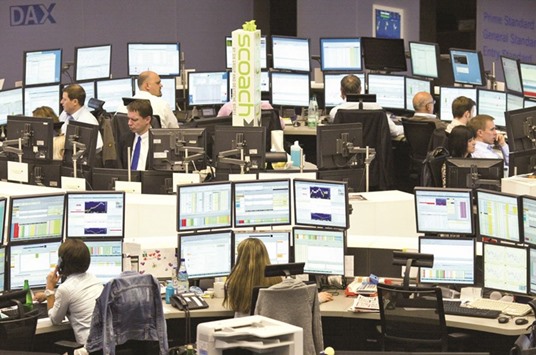World stocks rallied yesterday to extend their recovery after recent turmoil as oil prices gained and despite heightened fears that Britain could quit the European Union rattling the foreign exchange market.
Europe’s main indices displayed satisfying gains at closing, with the focus firmly on Britain as sterling plunged to a near seven-year low against the dollar at one point after the latest Brexit twist ahead of a British referendum in June on its EU future.
Frankfurt’s DAX 30 closed 1.98% up at 9,573.59 points, followed by the Paris CAC 40, which was up 1.79% at 4,298.70 points, while London’s benchmark FTSE 100 index rose by 1.47% at 6,037.73 points. Stocks on the Milan exchange, meanwhile, soared more than 3.5%, buoyed by banking shares. The Euro STOXX 50 was up 2.19% at 2,933.91 points at close.
And in a reminder that all was not well within the eurozone either, data yesterday revealed a sharp drop in private sector business activity across the single currency bloc.
Shares on Wall Street also furthered opening gains to join the global equity rally.
US oil prices rose more than 5% after the International Energy Agency said US shale production could fall by 600,000 barrels a day in 2016, lessening a global glut.
However oil prices will remain low at least until next year, the IEA also warned.
Analysts saw the “Brexit” discussion rumbling on with sterling likely to remain under pressure.
John Higgins, of Capital Economics, said they forecast sterling falling further against the dollar this year but said that, like in the 2014 Scottish referendum on remaining part of the UK, the exchange rate could rebound if it became clear that British voters would opt to stay in the EU.
The latest developments sent sterling falling heavily against the dollar in early afternoon trading to its lowest level since March 2009 — $1.4058 — before recovering slightly. The currency was also under pressure against the euro for much of the trading day.
Global banking giant HSBC yesterday reported a shock pre-tax loss in the last quarter of 2015 with results for the year missing analysts’ expectations.
Meanwhile in the eurozone, a closely watched survey indicated private sector business activity slowing sharply in February and warned that the economic outlook could weaken even further.
Data monitoring company Markit said the downbeat data showed stagnation in France and slumping demand in powerhouse Germany were adding to already significant deflationary pressures, which can be very damaging to the economy.
Markit said its closely watched Composite Purchasing Managers Index (PMI) fell to 52.7 points in February from 53.6 in January, hitting a 13-month low.
The reading was still above the 50-point boom-or-bust line, showing the 19-nation eurozone economy continued to expand, albeit at a slower pace.

Brokers working at the Frankfurt Stock Exchange. The DAX 30 closed 1.98% up at 9,573.59 points yesterday.
